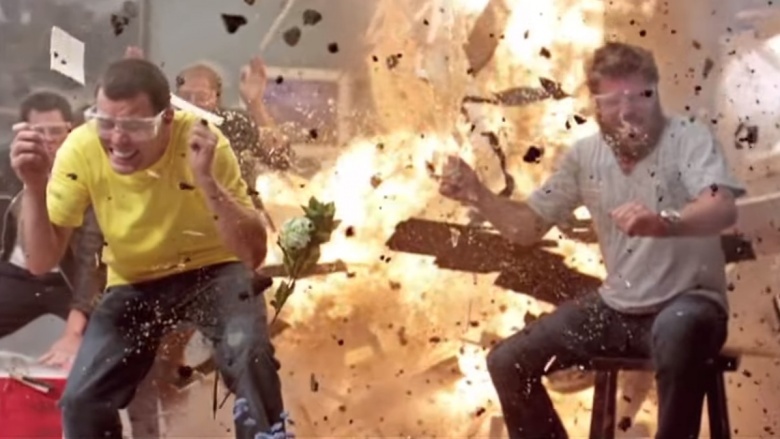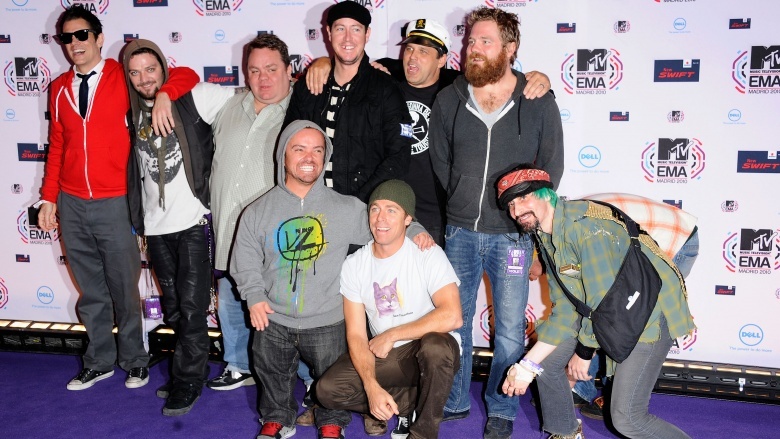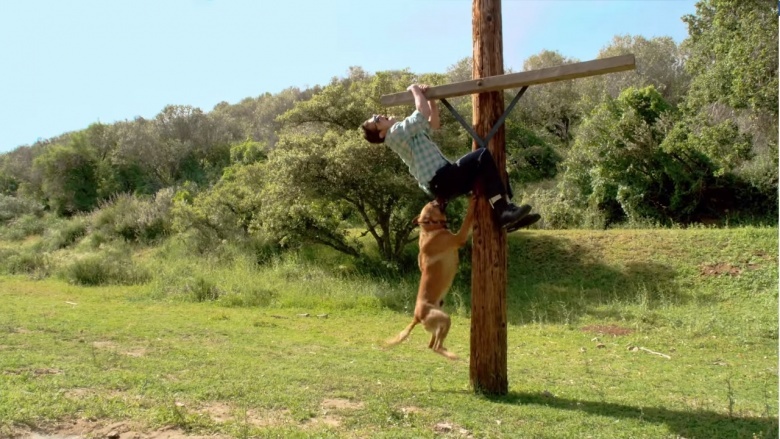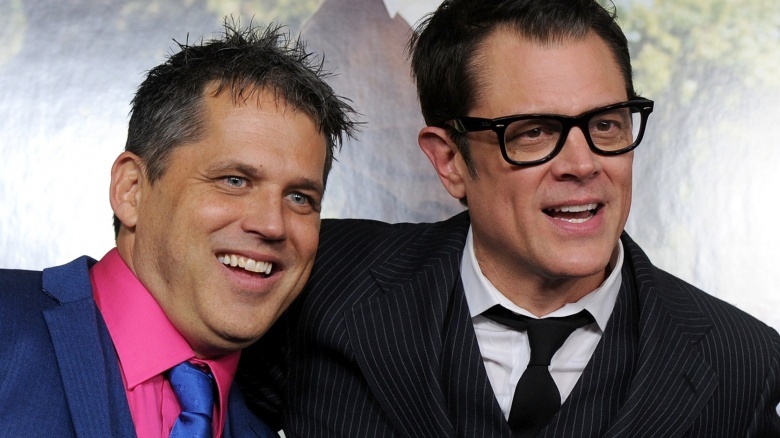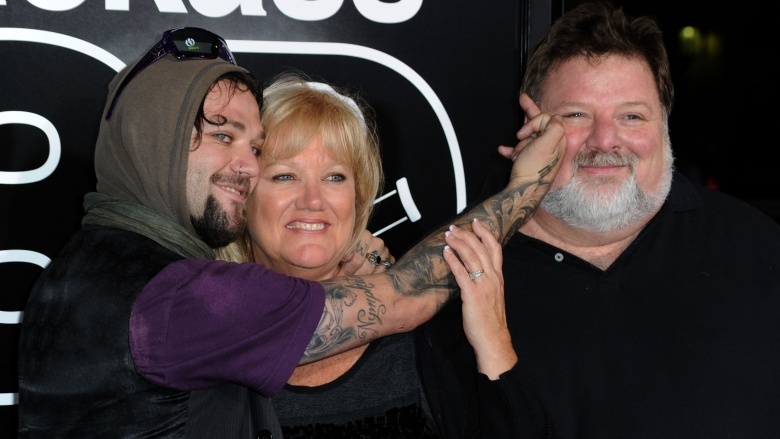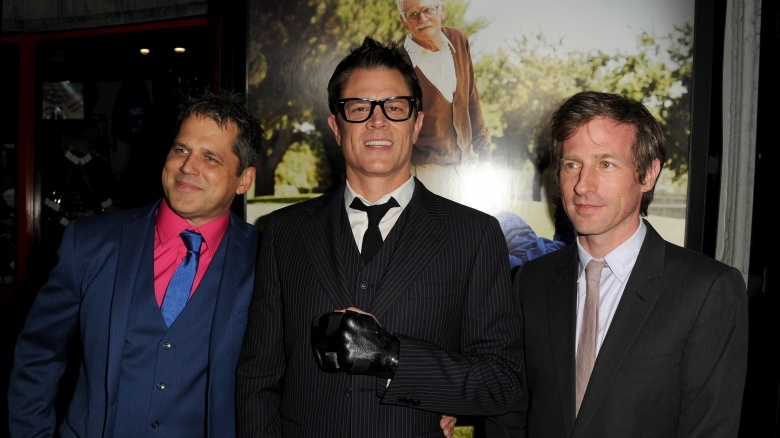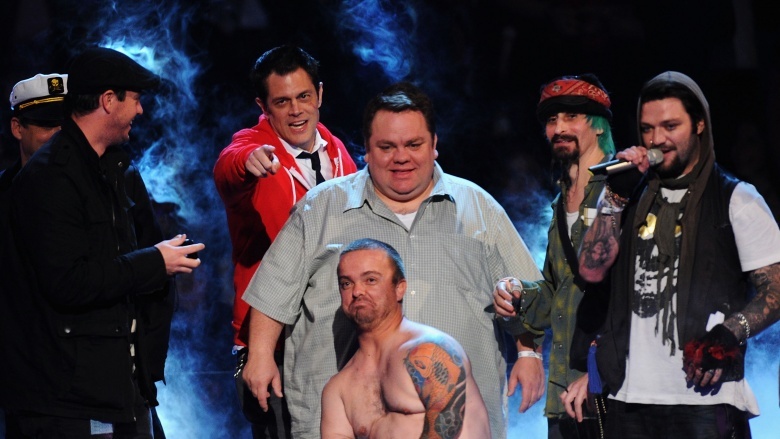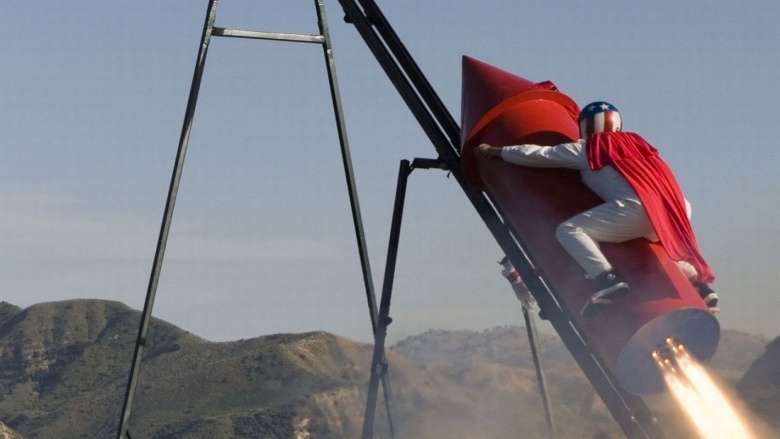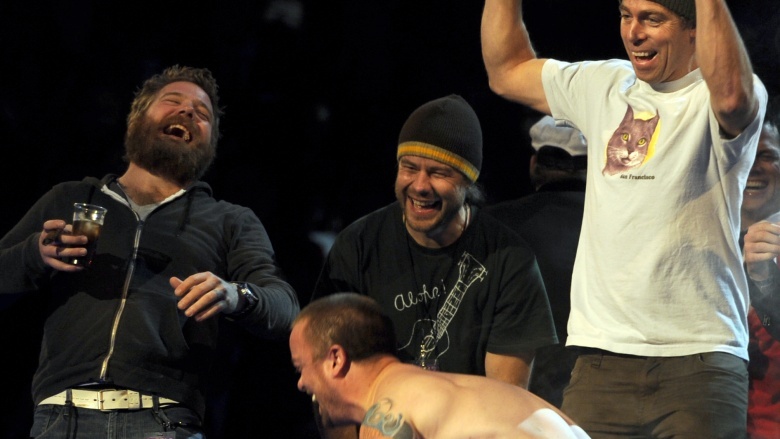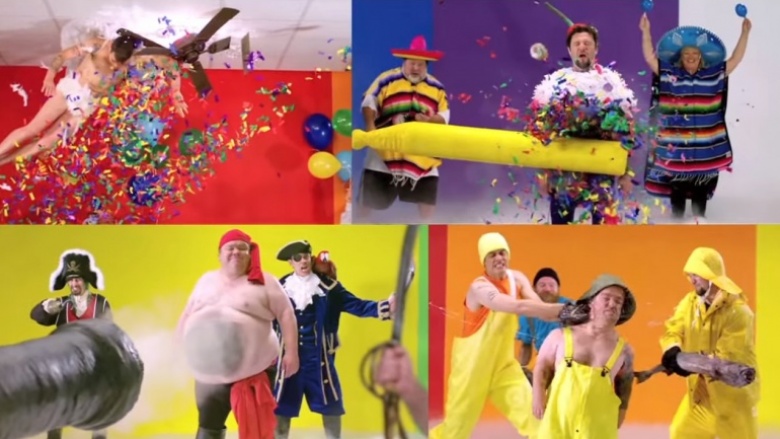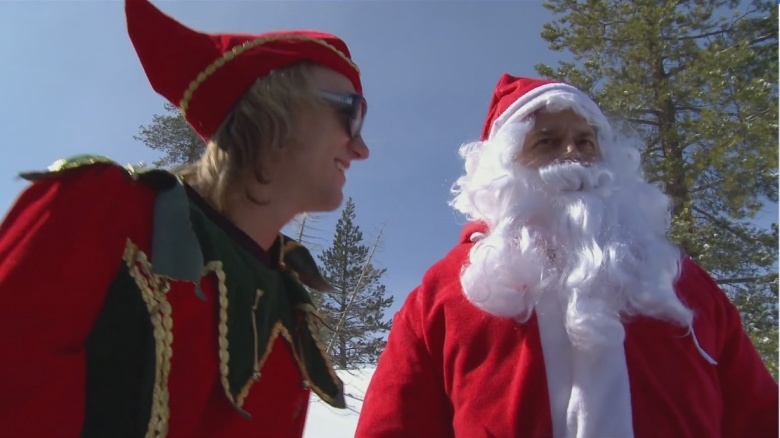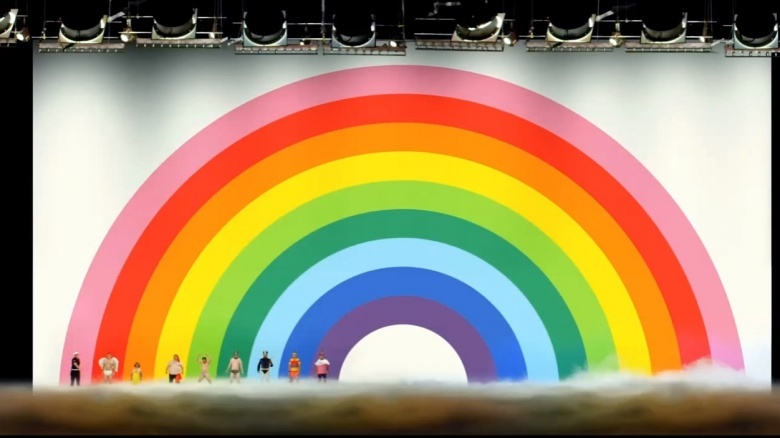Why Society Is Worse Without Jackass
The outrages of previous eras inevitably seem quaint to later generations. Video games, rock and roll, uh, vaping—in the rear view, it's often hard to divine what the problem could have been. So it goes with Jackass, the long-running prank and stunt series of international renown, and the only multi-million dollar Hollywood franchise ever to exist in which the sperm of a horse was knowingly consumed by a man—and we all watched. Blessed be.
Worryworts of every era get a lot of mileage out of imagining that they're witnessing the end of the world. But if Jackass was supposed to be the sack of Rome that single-handedly destroyed western society, there's more than a little irony to be found in the heights of success it achieved. Three seasons on MTV, when MTV still near the summit of the cultural zeitgeist. Three movies and a spinoff feature. It made a legitimate movie star out of Johnny Knoxville, so it's hard to convey just how much controversy this show attracted at the height of its popularity. These were the good old days. So it raises a question—if Jackass was some great cultural scourge, corrupting our children and lowering our standards, dragging us down as a society, then why do we feel so much worse off without it today? Why, without a constant Jackass presence in our lives, does everything feel like it's falling apart?
You may feel we're being dramatic. Not so—these arguments have been carefully considered, and by the end, we're sure you'll agree. But before we begin to present our case, we must first discuss our cast of characters: the stars of Jackass, the motliest crew that ever existed.
The Boys
Jason "Wee-Man" Acuna. Preston Lacy. Chris Pontius, a party boy turned party body. Bam Margera, a marblemouthed redneck skater boy. Ryan Dunn, may he rest in peace. Steve-O, force of nature, and Ehren McGhehey, the one no one remembers, who had to point to his own face on the DVD cover to remind a fan what he was doing signing her copy of Jackass the Movie. These are our heroes, these are the boys. They were the originators. For the most part, they're all still alive.
Particular sets of skills
One of the most genius accidents of the Jackass crew's lineup was its relative diversity. Everybody brought something different to the table, letting Jackass dip into recurring bits using stock routines. Whether you're in the busy streets of downtown Tokyo dressed as "night pandas" or innocently winding down in the lobby of a Florida motel, the sight of massive Preston chasing diminutive Wee-Man is never not magnetic. Some could skateboard, some could play guitar, some had country-fried bona fides, and the result was inevitably unpredictable and magical. Whether it's Wee-Man as an Oompa Loompa or Steve-O doing a pretty credible job as a former clown stiltwalking, the bench at Jackass went deep.
Multiple Visions: The Big Brother Connection
Jackass established its reach organically, owed mostly to its roots in two distinct operations that came together to form the whole. West Coast and East Coast, Good and Bam. Half of what we call today the Jackass crew got its start at the magazine Big Brother, and while it was ostensibly a skateboarding magazine, showcasing tricks and rising stars such as Jason "Wee Man" Acuña, it was also an anything-goes deep dive into trash culture that produced proto-Jackass videos on the side. Enter Johnny Knoxville. In what may fairly be called the first Jackass stunt ever, Knoxville, a writer for the magazine, had been assigned to test the durability of different non-lethal weapon options, a seed of an idea that would bear fruit often in the developed show and movies. A star from the start, he took the pain and tazed himself, ending the segment disappointed that they wouldn't let him take a bullet to his vested chest.
Multiple Visions: The CKY Crew
Meanwhile, in Westchester, chaos reigned against a backdrop of the driven snow. Under the guise of making promotional videos for the thrashy, trashy local metal band CKY, in which Bam Margera's older brother Jess played drums, Margera enlisted his friends to produce slickly edited chronicles of deliberate mayhem, semi-violent pranks, and of course, skateboard trick sequences, all set to a crunchy score coming at you straight from the white-topped wilds of eastern Pennsylvania. Composed of later Jackass cast members Ryan Dunn, Raab Himself, Rake Yohn, Brandon "Dico" DiCamillo, and Margera's poor parents April and Phil, the CKY crew put out videos with a destructive edge, turning suburban boredom into domestic terror. There was no ulterior motive here: it was mayhem for the sake of mayhem, and you couldn't turn away.
The road to MTV
By all accounts, Jeff Tremaine smelled money. He began recruiting outside of Big Brother, enlisting the CKY Crew after seeing their self-produced videos. He called on industry friends, specifically the respected director and writer Spike Jonze, who loved the idea, and drafted a pitch package along with Knoxville and Tremaine. You know the rest.
The fact that the show was born out of more than one vision is more than a happy accident; it made the show sweeping, all-encompassing, and unpredictable. We never knew where we would see a stunt, or with whom. It added an element of essential chaos to the Jackass recipe, all these shared visions, united in the name of pranks and anarchy. It shouldn't have been so perfect. It shouldn't have worked at all.
Professionals in the Age of YouTube
There's something to be said for having professional cinematographers and decent production values. And there's also something to be said about having respect for your audience, which is something Jackass had in large supply—something the copycats they inspired largely lack. It's no secret that the new home for pranks, stunts, and general jackassery is YouTube, with all its channels and GoPro-fueled uploads. As Jackass grew in popularity, it eventually attained the production values and coordination of a real Hollywood gig. (Though this didn't always lead to stacks of sky high cash in the budget. As Bam memorably lamented during a disco roller skating sequence in the back of a semi filmed for the first movie: "We're doing a g*****n Paramount motion picture, and we can't put on fog and lights at the same time? That's not too much to ask, man.") Okay, so maybe that professionalism didn't always make it to the screen, but you could at least tell they cared about the product, not just views. They respected the audience more than the bottom line.
Real, all too real
With the rise of prank-based YouTube channels, that respect got lost in the translation, with many content creators simply lying their way into a prank empire with painfully fake, staged, stupid videos that insult the intelligence of the viewer. (Wow, that just happened out of nowhere! It's a good thing we had this giant crew with cameras rolling and everyone's lapel mics were on!)
There's a big difference in approach and ethos here: Jackass was never trying to sell you anything but what it was. The only way the name of the show could've been more accurate is if they'd called it "Jackasses", because other than that, they gave viewers the unvarnished truth. It's what makes a Jackass stunt so exciting: they don't know what was going to happen. They didn't really practice. So when razor-sharp shrapnel shoots out of a Looney-Tunes-esque rocket at nine hundred miles an hour inches away from Johnny Knoxville's chest, almost killing him, you're seeing a real moment. If it had gone wrong, you would've seen the accident on TMZ, and the movie probably would've been unceremoniously shelved. This was real. The movie takes a second to breathe as cast and crew react. You connect to the moment. You fear for Johnny's life! And, on the other side of the coin, you find it that much cooler when he immediately jumps on the back of a fresh rocket, eager to get the stunt done right. This is endlessly more satisfying than faux reality garbage like this. Not even Steve-O himself can inject excitement into this overproduced wet noodle of a monster truck rampage. All sound, no fury, these pretenders to the throne.
True bromance
Jackass first premiered on MTV in October of 2000, and is categorized on Wikipedia as being in the genre of "toilet humor." So why is it 16 years later and we're still so attached to this? We'll tell you. A true Jackass fan? That's the story of true love. These are fans who buy the DVDs, turn out in theaters, share old clips on the internet. They go behind the scenes, they listen to the commentaries, because beyond it all, when the performance is all over, Jackass fans are fans of the people. A lot of that has to do with how the guys were big fans of each other—and we're not just talking about Johnny Knoxville turning up in Wildboyz every once in a while. No, they're a borderline love coven, and they don't shy away from this in interviews. Ask Johnny Knoxville if Jackass was a little gay, and he'll be offended you implied it's only a little: "We're over here sitting on rainbows and you say a smidge. We're a gay pride parade that's happening! And in 3-D!"
An essential sweetness
It's this attitude that helps make Jackass so enduringly enjoyable: at the end of the day, it's all love. The joke never feels like bullying, which is something modern-day pranksters tend to persistently forget while goading people into street fights or trolling people who are simply doing their jobs. With Jackass, the joke was always much more innocent. It's the crux of the old man/old lady pranks that eventually led to Bad Grandpa. The victim of the prank may have to see old man balls, but the joke is that old man balls are funny, not "you suck, balls in your face." As the adage goes, no harm, no foul. Sure, is it briefly uncomfortable to have your yoga class disrupted by a man who can't stop farting? Sure, maybe. But it's not like anybody's getting their feelings hurt.
They're not mean
This is the philosophy that made Jackass a secretly tolerant, humane boon for society. So many pranks today, like racist "in the hood"-style troll excursions, aren't so much jokes as they are filmed provocations, meant to make otherwise reasonable people angry to the point that footage is generated. It's the nadir of creativity, not to mention incredibly mean. One of the only times it got physical with a bystander on Jackass was when someone else attacked Chris Pontius, presumably under the impression that he was the real and risen devil, Beelzebub himself, not just a dude in a Devil costume with a personal vendetta to keep God out of California. They didn't even show the attacker's face. It's high-ground lowbrow humor, and that's the secret to the recipe for making everybody laugh.
We need them more than ever
Overall, we had it best with the pros, and if there was ever a time for moral outrage, it should probably be directed at the narcissist racists who bait innocent people into punching or drawing guns on them by threatening them into action. It's harassment, it's cringeworthy, it's rude as hell. Of the groups that Jackass spawned, only a handful have made good on their inspiration: Wonder Showzen and Adult Swim's Dickhouse-OFWGKTA co-production Loiter Squad have a little Jackass in their DNA, making for a fun, guilt-free watch. But you've got to cut a path these days to get to the good stuff; there's a lot of garbage in the way. One more reason why we need Jackass now more than ever. That name, once the scourge of nightly news shows everywhere, is now a sign of something else: high quality, and a guaranteed good time. So take care of yourselves, boys. If you ever decide to go for one last ride, we, at least, will be ready.
